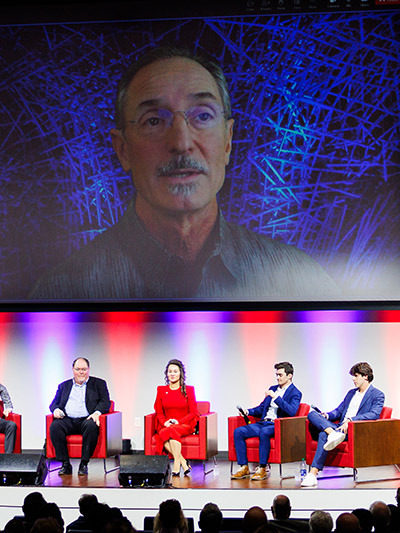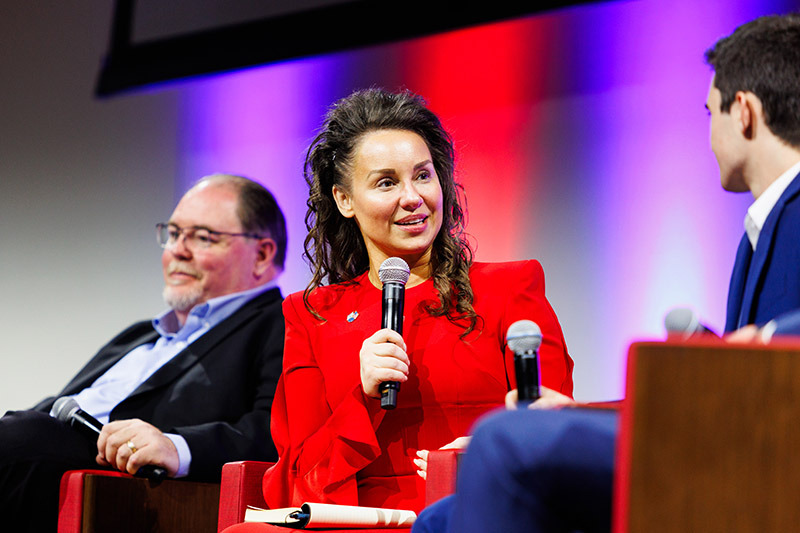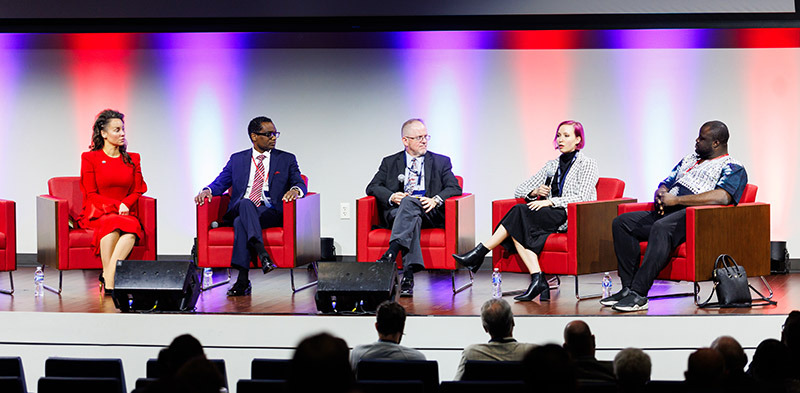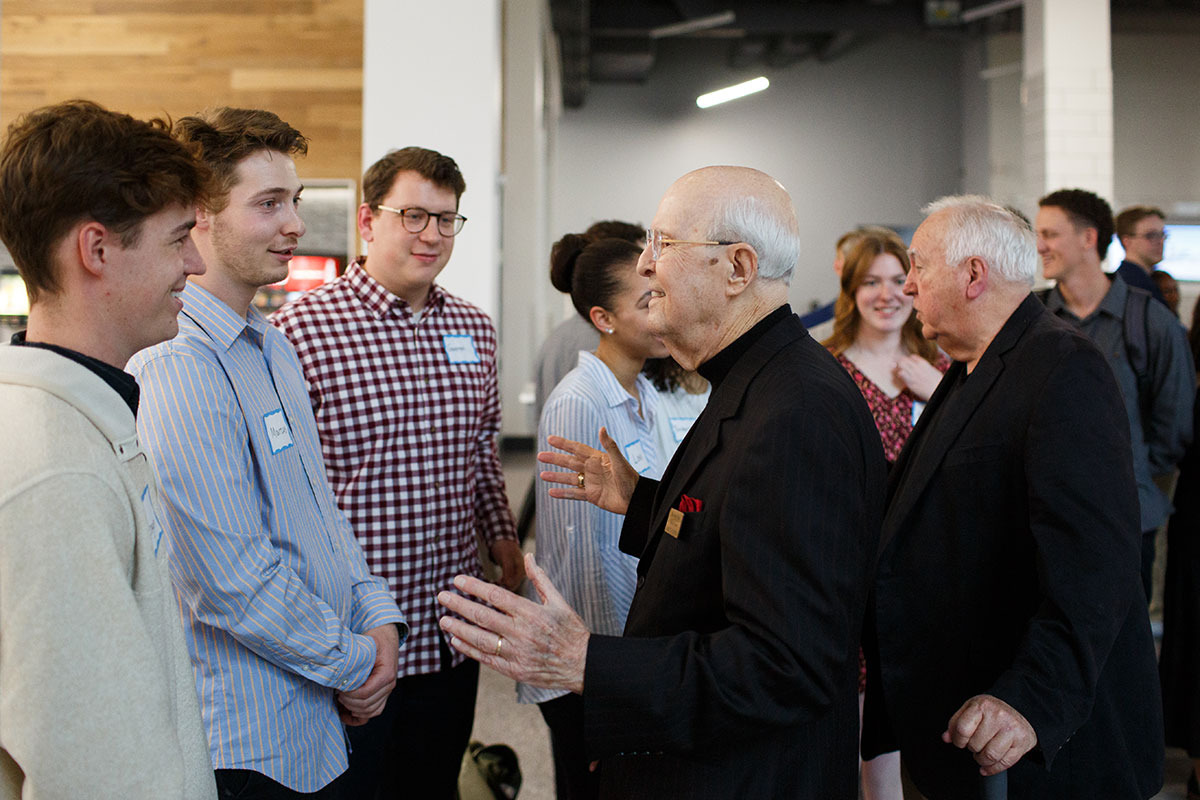Search News Archives
Filter News Articles
Additional Navigation
Siri creator joins tech executives on AI panel during Liberty’s CEO Summit
October 13, 2023 : By Ted Allen - Office of Communications & Public Engagement
The emerging technology of Artificial Intelligence (AI) can be used for good or evil, with unlimited potential to change the world we live in both now and increasingly more so in the future.
As part of this week’s CEO Summit: Networking the Nations, Liberty University students, CEOs, computer engineers, and ethicists participated in two panel discussions on Wednesday in the School of Business Towns Auditorium. Participants discussed the practical applications of AI and encouraged those in the audience to embrace the new technology while harnessing and shaping it into a force for positive change.

T’Neil Walea, a tech executive and AI specialist with Microsoft, moderated the first session titled “Leveraging Emerging Technologies (Artificial Intelligence and Blockchain).” Siri creator Tom Gruber, one of the “fathers of emerging technology,” zoomed in virtually and offered a status update on AI.
Levi Binkley, a Liberty graduate and founder and CEO of Moria, introduced Gruber as the co-founder, CTO, and product designer of Siri, “the first conversational artificial intelligence used on a mass scale … 25 billion times a month.”
Siri was purchased by Apple, where for eight years Gruber led its advanced development group. He said AI used in ChatGPT (Generative Pre-trained Transformer) is based on large-language models.
“It’s like having a personal assistant … who has been trained on content that would take a million human lives to consume,” Gruber said, noting that GPT-4, OpenAI’s most advanced system, speaks over 100 languages fluently and can read and write as well as college graduates on written tests. “(It) can pass the law exam, the BAR exam, on the first try without studying.”
He noted that AI technology is relevant to anyone who utilizes language in their work as it can be prompted to perform a wide variety of tasks, from writing essays to writing computer code.
“It can help a lot of people be more productive,” Gruber said. “Students, teachers, office workers, CEOs, marketing people, journalists, novelists, customer support people, lawyers, politicians, pastors, professors, and sales people — anyone whose job is to consume and produce language will see their work significantly impacted by this technology.”
However, he acknowledged that this same technology can cause the breakdown of trust in human society.
Walea, who formerly worked as IBM’s Industry Chief Technology Officer for the Department of Defense to help use quantum data for developing AI, said that AI still carries an inherent risk.

“AI in the hands of good actors — in the hands of believers, in the hands of those who use it ethically, morally, and want regulations around it — is simply a tool,” she said, “however, in the hands of bad actors and in the hands of those who don’t have the moral and ethical guidelines and boundaries on it, it can be a weapon.”
She challenged those in the audience to play active roles in what she considers the fourth industrial revolution.
“Are we going to utilize this technology?” Walea asked. “As believers, I feel like we have the option to run and hide, or we can face the future with faith and we can be the leaders in the area.”
To provide a storm cloud warning regarding the dangers of AI, the panel also included Joe Allen, author of “Dark Aeon: Transhumanism and the War against Humanity.”
He described ways that AI is being used in Silicon Valley in California to create a false god, Artificial God-Like Intelligence (AGLI), “like a demiurge from gnostic technology” or “a god in silicon.”

“When you look at transhumanism — and the impacts of artificial intelligence, genetic engineering, robotics, and … brain-computer interfaces — what you are looking at is a … religious worldview,” Allen said. “Transhumanism answers all the questions that religion raises and answers … with technology.”
Binkley said AI can be used positively as an instrument to advance God’s Kingdom, referencing the Gutenburg Press and the internet as examples.
“I’m not saying there’s not bad stuff that came from the internet, but look at all of the good that has come from this emerging technology,” he said. “Just our cell phones alone, think of how many things you can do with that to not only share the Gospel, but to lead effective businesses, to make governmental decisions. The technology will not overtake us. Reason, wisdom, those are divinely human traits. If we wield it the right way, we can make an impact far beyond, greater than what the bad can.”
The panel also included Liberty student Sam Bodine, a defense intern specializing in cybersecurity at Lockheed Martin; Jacob Hall, CEO of Agingo who has 20 years of experience in investment banking; and Chris Conlan, CEO of Conlan Scientific.
“There are things to be concerned about with AI,” Hall said. “But like all technologies before it, God created us in His image, and one of the things I’m most happy about is we get to create, and I’m pretty sure we’re not God, so we can’t create God, as much as people want to think AI is. Artificial intelligence is nothing more than an expert system. Advanced blockchain technologies are the answer to it, because it will put us back in control, and we had control issues long before … artificial intelligence came along.”
The following panel, “Cyber Security Platforms & Artificial Intelligence Implementation,” was moderated by Ret. Col. John Mills, the former Department of Defense director for cybersecurity, policy, and international affairs who has more than 30 years of national security service and now works for The SPECTRUM Group. Other panelists were Walea, Iyinoluwa Aboyeji, founding partner of Future Africa; Jerry Overton, CEO of AppliedAIStudio; and Alyson Kruetzer, CEO of SailAI.

Aboyeji, a venture capitalist based in Nigeria who uses cyber technology in his work, said AI’s potential for good outweighs the risks of it being used for nefarious purposes.
“The cover of darkness can be used to perpetrate evil,” he said. “Sunlight is the best disinfectant. (AI) is a powerful tool, and anybody can use it, but … transparency is an incredible thing. The closer we can get to a world where everybody who touches a piece of AI can know who has accessed that information, how it’s being used, who’s using it and for what reason, the more likely you are to have a situation where less people abuse it.”
Overton said his company used AI to automatically arrange the logistics for food that would otherwise be wasted to be picked up and donated to those who are food-insecure and to generate tax deductions for those companies donating it.
“We have front-row seats to the advent of a brand new, really powerful technology, so each of us has this choice now to make,” Overton said. “What would you do, because we have an opportunity to make some of those things happen, things that AI can help you with.”
As an entrepreneur, Kruetzer said she is always looking for problems to solve, and AI can help her do that.
“A lot of us just think the world’s been created and we just exist in it,” she said. “That is so not true with AI. There is so much to be done, and it’s a perfect time to get in there and figure out what do you want to do with it, what do you want to create with it.”


